
The Complete Guide To Plant-Based Milk
Mar 13, 2024| By JOI team
Mar 13, 2024| By JOI team
The Complete Guide To Plant-Based Milk
Almond-Base | Beverage | Cashew-Base | Creamer-Base | Dairy-Free | Oat-Powder | Recipe | Vegan |
What is plant-based milk? Plant-based milk refers to a water-based extract, of sorts, created from nuts, seeds, and other foods. The plant-based liquid can be used for drinking and cooking like cow’s milk, but without the animal connection. Non-dairy milk replacements are perfect for vegetarians and vegans, and the environmental impact of non-dairy beverages is much smaller than that of cow’s milk production.
Today, these water-based plant extracts are all over the world, but where did they come from; are they healthier; and how much does the production of cow’s milk really affect the environment?
History of Plant-Based Milks
We may think that plant-based alternatives to milk are a recent discovery, but the word “milk” has been used to describe plant juices or plant-based milk alternatives since ancient times. Some occur naturally like the milk found in the coconut, and others are nut purees or bases mixed with water.
Coconut milk, originating in Southeast Asia and India, is one dairy-free nut milk with a long history. Then, in the mid-1300s, soy milk was introduced in China. Soy milk was typically used in cooking until the late 1800s when people started drinking the milk.
Even almond milk is linked to a lengthy history. The first mention of almond milk was in cookbooks throughout Egypt and Iran in the 13th century. Horchata, an almond milk-based beverage, was mentioned in literature in the 8th century. The use of almond milk didn’t take hold until the early 19th century, and today remains one of the most popular dairy substitutes for milk. Rice milk, on the other hand, is a newbie to milk-like plant juices thought to be developed in California in 1921. Fast-forward to 2020 and you'll find us, JOI, a first of its kind almond base revolutionizing the way we create and consume plant milks today!
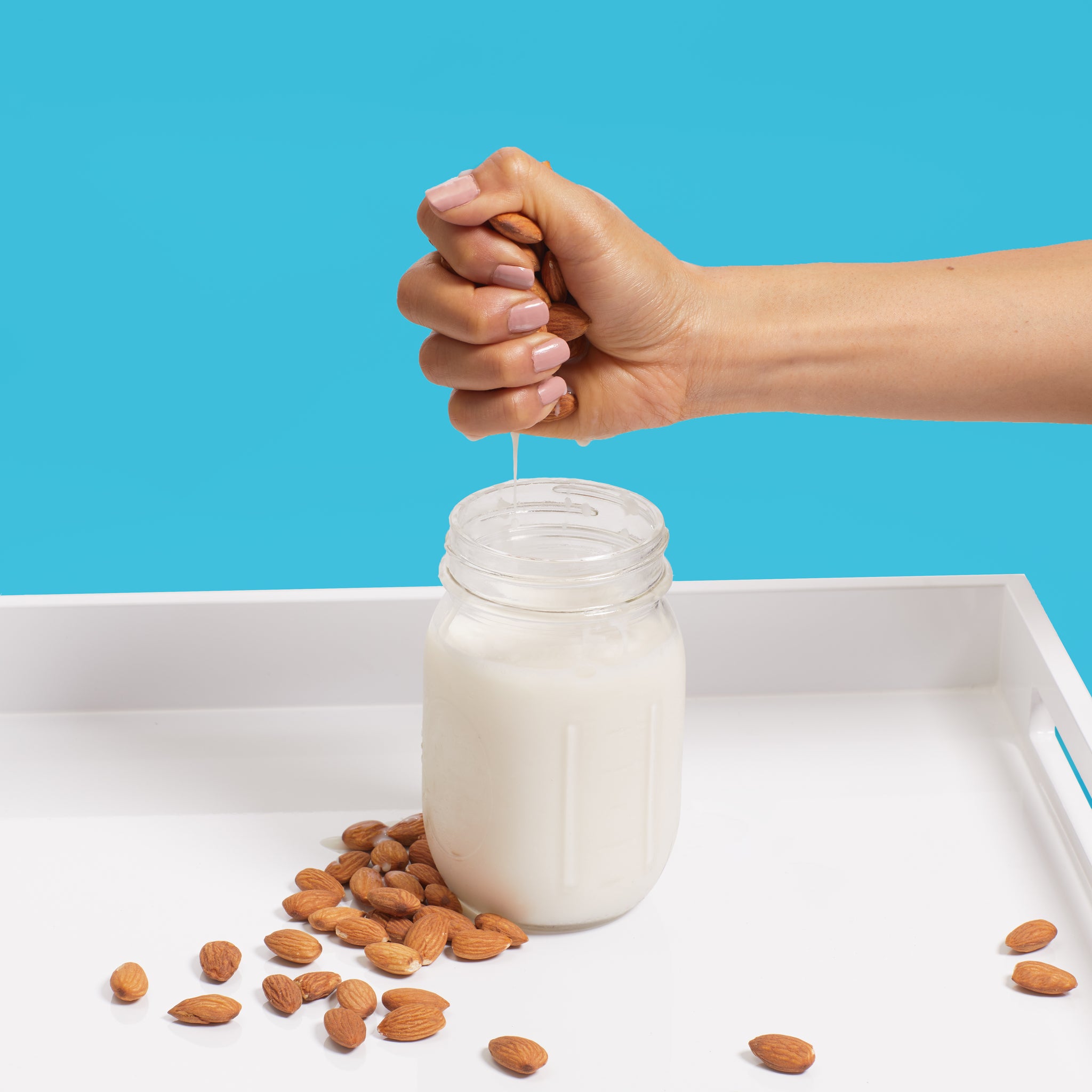
Is Drinking Milk Healthy?
The jury is out on whether or not dairy-based milk is healthy or unhealthy. Research has shown that the nutritional value of milk may outweigh any risk factors, based on a 2016 study in Food & Nutrition Research. According to the review of research, “the totality of available scientific evidence supports that intake of milk and dairy products contribute to meet nutrient recommendations, and may protect against the most prevalent chronic diseases, whereas very few adverse effects have been reported.”
However, lactose has been known to cause gastrointestinal side effects like gas, bloating, cramping, and diarrhea, among others, in some people. As a matter of fact, about 65% of people have an impaired ability to digest lactose or milk sugar, says Genetics Home Reference.
Cow’s milk is also a source of saturated fat. Saturated fat falls into the category of an “unhealthy” fat - and is one you should consume in minimal amounts. The amount of saturated fat per one-cup serving varies based on the milk percentage.
Whole Milk: 4.6g of saturated fat
2% Milk: 3.1g of saturated fat
1% Milk: 1.5g of saturated fat
Skim Milk: 0.1g of saturated fat
The American Heart Association recommends no more than 13g of saturated fat daily - preferably less.
So, deciding whether or not drinking milk is healthy would be a personal choice. There are experts, research, and doctors that fall on both sides of the debate.
What Can Plant Milks Be Made From?
Plant-based milk types can be made from any nut or seed. The most common plant-based milk types today are coconut, almond, cashew, pumpkin seed, flaxseed, hazelnut, and hemp milks. Rice and soy are also commonly used to make fortified and non-fortified milk alternatives.
Other foods that can be used to make plant milk include:
- Grains: barley, fonio, maize, millet, oat, rice, rye, sorghum, teff, triticale, spelt, wheat
- Pseudocereals: amaranth, buckwheat, quinoa
- Legumes: lupin, pea, peanut, soy
- Nuts: almond, brazil, cashew, hazelnut, macadamia, pecan, pistachio, walnut
- Seeds: chia seed, flaxseed, hemp seed, pumpkin seed, sesame seed, sunflower seed
- Other: coconut, potato, tiger nut

Types of Plant-Based Milks
What are the most common types of plant-based milk? We tool a look at 13 options and the nutritional information per cup. From here, you can compare flax milk vs. almond milk or soy milk vs. flax milk to best fit your tastes and needs.
*Average Nutritional Content From Plant-Based Milks in Cartons at the Grocery Store*
Soy Milk: 131 calories, 4g fat, 15g carbs, 8g protein
Almond milk: 39 calories, 3g fat, 3.5 carbs, 1g protein
Cashew milk: 25 calories, 2g fat, 1g carbs, 1g protein
Coconut milk: 552 calories, 57g of fat, 13g carbs, 5g protein (when extracted directly from the coconut)
Hemp milk: 83 calories, 7g fat, 1g carbs, 5g protein
Quinoa milk: 222 calories, 3g fat, 41g carbs, 8g protein
Oat milk: 120 calories, 5g fat, 16g carbs, 3g protein
Rice milk: 112 calories, 2g fat, 22g carbs, 1g protein
Pea milk: 100 calories, 5g fat, 6g carbs, 8g protein (based on one plant-based milk brand)
Flax milk: 80 calories, 4g fat, 2g carbs, 10g protein (based on one plant-based milk brand)
Hazelnut milk: 100 calories, 9g fat, 1g carbs, 3g protein
Walnut milk: 120 calories, 11g fat, 1g carbs, 3g protein
Macadamia milk: 70 calories, 5g fat, 1g carbs, 1g protein
Peanut milk: 150 calories, 11g fat, 6g carbs, 6g protein
JOI Almond Milk: 94 calories, 8g fat, 3g carbs, 3g protein
JOI Cashew Milk: 88 calories, 7g fat, 5g carbs, 3g protein
JOI Hemp Milk: 101 calories, 9g fat, 1g carbs, 5g protein
JOI Oat Milk: 85 calories, 2g fat, 16g carbs, 2g protein
JOI is packed with healthy fats, protein and fiber because we use the entire nut or seed! Since JOI is a concentrate, you have complete control over the process and how nutritious you want to make your JOI plant milk. Some of the healthiest plant-based milk can be used as a vegan milk replacement or a vegan substitute for cereal. JOI is 100% vegan and gluten free, and has endless possibilities as a dairy substitute with cooking, baking and more. Try JOI today!
A Focus on Soy Milk
“The Soyfoods Association of North America reports that U.S. sales of soy foods reached $3.9 billion in 2003, continuing an 11-year trend of 15% average annual increases. According to the United Soybean Board’s 2004–2005 Consumer Attitudes About Nutrition report, 25% of Americans consume soy foods or beverages at least once per week, and 74% view soy products as healthy,” as per Environmental Health Perspectives. Soy milk is a big deal, but what do we really know about it?
Soy milk is one of the most popular milk alternatives available today. Natural soy milk is a byproduct of tofu production. When it comes to nutrition, soy milk is quite similar to cow’s milk. One of the things that set soy milk apart from other plant-based milks is the protein content. In natural form, soy milk contains more protein than almond, cashew, coconut, and rice milks combined.
Soy contains plant compounds, phytoestrogens, and isoflavones that have been shown to have, though currently being debated, cardioprotective benefits. It is the same beneficial phytoestrogens and isoflavones that have caused an uproar in the plant-based community about the safety of soy milk.
Anti-Soy Movement
Soy milk is a constant subject of debate in the plant-based community. Some people, including experts and researchers, swear that soy products, including soy milk, is safe to consume without any risk to your health - and there is research to support this claim.
According to a 2016 review of research published in Nutrients, soy foods may reduce the risk of developing certain health conditions of the prostate and breast.
An earlier review of research from 2010, also showed that isoflavones had no adverse effects on health, as published in the Journal of Nutrition.
We even found research that showed soy products can help reduce waist and hip circumference, according to the International Journal of Preventive Medicine and the Journal of the American College Nutrition.
There is a flip side to the coin that’s at the center of the anti-soy movement. The isoflavones in soy foods and soy milk may have estrogen-like effects on the body. This is cause for concern for both men and women, as estrogen plays a role in various body processes, according to the Nutrition Journal, including:
- Breast Growth
- Regulation of Menstrual Cycles
- Cholesterol Regulation
- Bone Health
- Brain Health
- Mood
Because of the close connection between estrogen and these body processes, anti-soy advocates claim soy foods should be avoided at all costs.
What are the potential risks of consuming soy milk and soy products?
Thyroid Health
One risk that comes up in research is thyroid health. Soy food products are thought to impact how the body processes thyroid medications. As per the journal Thyroid, “some evidence suggests that soy foods, by inhibiting absorption, may increase the dose of thyroid hormone required by hypothyroid patients.”
Additional research in Public Health Nutrition shared the same results, though thyroid function was not affected in men - just women. “In women, high consumption of soya was associated with elevated TSH [thyroid stimulating hormone] concentrations. No associations between soya intake and TSH were found in men.”
To hamper the possible effect on thyroid medication, the Mayo Clinic suggests waiting at least four hours after taking medication for your thyroid before eating or drinking soy-based products.
We did find a small study in men that showed increased cognitive decline when tofu was consumed on a near daily basis. The research, which was published in the Journal of the American College of Nutrition, was completed in the 1960s.
The effects of soy products on menopause, heart disease, cholesterol, and osteoporosis are part of on-going research. No definitive positive or negative connection between the two has been found.
Deciding whether or not the consumption of soy products is safe depends on a variety of factors, including:
- Age
- Health
- Weight
- Health of Gut Microflora
Pros and Cons of Soy Milk
Pros
- There has been some clinical evidence that soy may have health benefits
- Soy milk has nearly the same nutritional profile as lower-fat cow’s milk
- Contains more protein than many other plant-based milks
Cons
- The National Health Service (UK) advises restricting soy intake in the case of hypothyroidism and other health concerns (NHS.uk)
- 94% of soy grown in the US is genetically engineered (USDA.gov)
- Soy can be an allergen for some people
- Soy may cause overexpression of genes that affect tumor growth (MSKCC)

Ingredients to Avoid in Plant-Based Milks
There’s a general consensus that plant-based milks are all healthy, but based on some ingredients, you could do much better making your own plant milks at home. Store-bought plant milks are rife with additives associated with side effects.
Additives and Preservatives
Gums and Emulsifiers
Guar Gum: Guar gum is made mostly of fiber, which can expand in the stomach. In the 1990s, a weight-loss drug made with guar gum was released after FDA approval. It was soon discovered that consuming large amounts of guar gum can cause esophageal blockage, blockage of the small intestine, and other severe side effects.
While there’s not as much guar gum as there was in the prescription weight-loss drug, foods and drinks should supply no more than 2% guar gum. Some side effects of consuming too much guar gum include cramps, diarrhea, gas, and bloating.
Gellan Gum: Gellan gum, though generally considered safe, may slow down the digestive process.
Locust Bean Gum: Studies have shown that locust bean gum may slow the absorption of calcium, iron, and zinc. It may also cause slow gastric emptying or an allergic reaction.
Xanthan Gum: Xanthan gum may alter gut bacteria, cause increased and softer bowel movements, or cause gas and bloating. People with allergies to dairy, wheat, soy, or corn should avoid xanthan gum, according to Healthline.
Lecithin: “Lecithin is converted by bacteria in the gut into trimethylamine-N-oxide (TMAO). Over time, TMAO may contribute to hardening of the arteries,” says MedicalNewsToday.
Carrageenan: A 2001 review of research in Environmental Health Perspectives shared that “the International Agency for Research on Cancer in 1982 identified sufficient evidence for the carcinogenicity of degraded carrageenan in animals to regard it as posing a carcinogenic risk to humans.”
Monoglycerides and Diglycerides: Eating too many monoglycerides or diglycerides (both fats) may cause the same adverse effects on health as saturated fats and trans fats. There’s also evidence that contamination during processing may bring monoglycerides in contact with lead, nickel, ash, cadmium, mercury, and arsenic, according to MedicalNewsToday.
Polysorbates: Typically polysorbate 60 and 80 are used in foods, including plant-based milk. It is used to emulsify ingredients and to prevent ingredients from separating. Some research has shown increased reports of diarrhea with the consumption of polysorbate 80.
Sugar: If the first three ingredients on your nut milk label are water, nuts, and sugar, you are basically paying for sugar water. Sugar adds no nutritional value to the milk. If you enjoy sugar in your coffee, be sure to review the recommended dietary guidelines for daily sugar consumption across your diet.
GMOs
GMOs, or genetically-modified organisms, refer to the genetic modification of plant genes in a lab setting. Bacteria and fungi are also organisms, so the modification doesn’t stop at plants. Foods are altered to lengthen shelf life, increase size, embolden taste, and other factors associated with the sale of the modified foods. There’s also concern with genetically modified oils like soybean, canola, corn, and cottonseed.
This is precisely why we created JOI. We wanted a single ingredient milk alternative with no additives, preservatives, emulsifiers or gums. With JOI, you get all the taste and nourishment of the whole plant with none of the other junk. Ready to try real plant milk for the first time? Give JOI a try.
Who Should Avoid Using Plant-Based Milks
According to the American Heart Association, the Academy of Nutrition and Dietetics, and the American Academy of Pediatric Dentistry, plant-based milks should not be consumed by children under the age of five. The premise is that plant-based milks aren’t packed with the same nutrients as cow’s milk. However, some believe the recommendation is somehow associated with the dairy industry. Nursing women should avoid using plant-based milk as a meal replacement or infant formula.
How to Use Plant-Based Milk
Plant-based milks can be used in just about any recipe you can imagine. Typically, a one-to-one ratio of plant milk to dairy milk is used. Depending on the consistency of the plant milk, the consistency of the dish may vary. For instance, cashew milk and almond milk may have different textures.
JOI was designed for milk but made for more. While JOI might be just one ingredient, the possibilities are endless. Explore our recipes to learn how you can add JOI to your kitchen and go beyond milk.
Plant-Based Milk Recipes
What exactly can you make with plant-based milks? Let’s take a look at a few recipe tips.
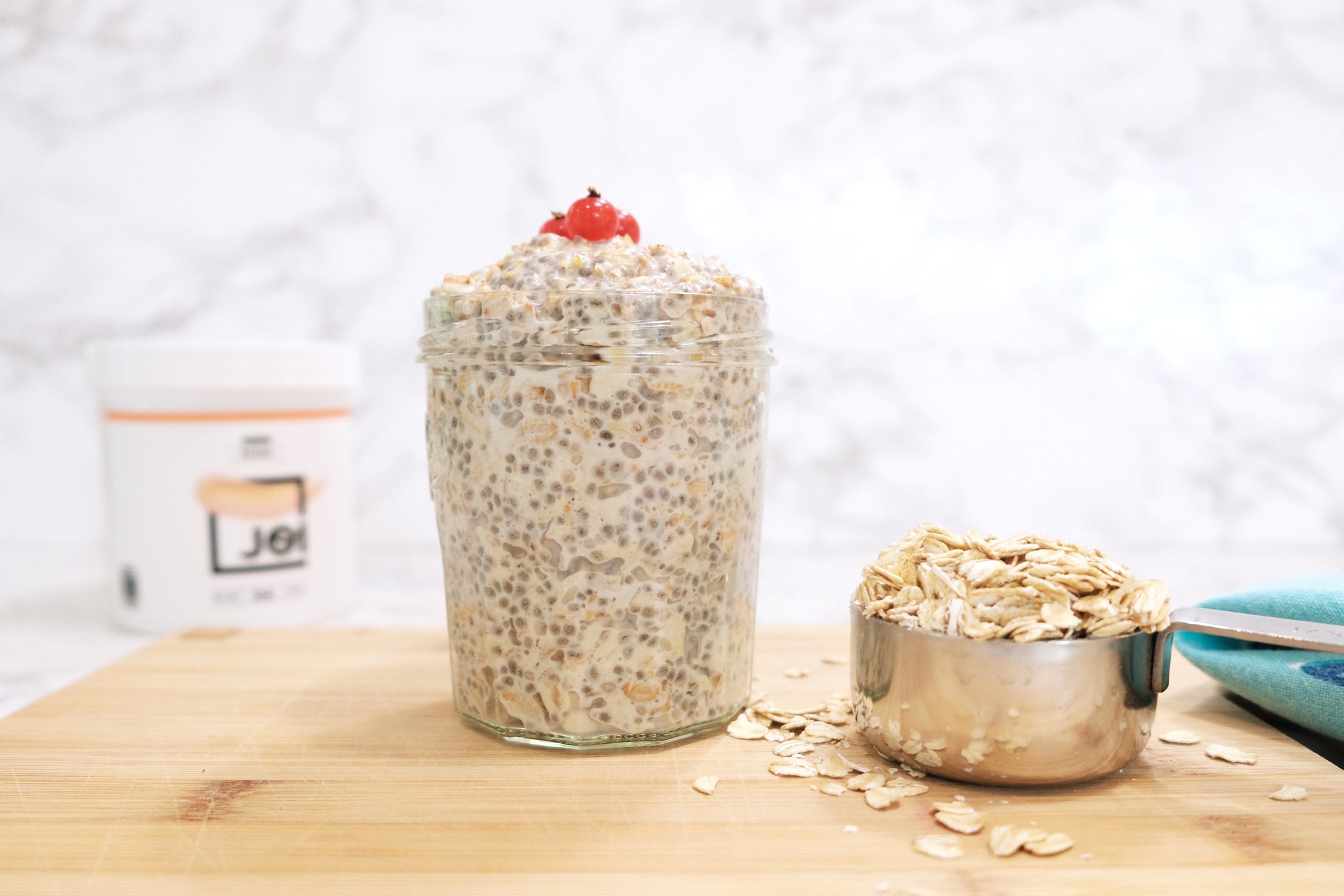
Breakfast
Some common breakfast foods and recipes perfect for plant-based milks include:
- Pancakes
- Oatmeal
- Chia Pudding
- Smoothies
In each of these cases, you substitute plant milk for cow’s milk at a one-to-one ratio. Plant milks tend to be thicker, so the consistency of the foods and drinks may change.
One particularly amazing recipe is for vegan french toast. Simply mix together a banana with some chia seeds, plant milk, and vanilla extract. Add a little maple syrup and cinnamon. When smooth, dunk bread into the batter and fry until brown on both sides.
You can also add plant milk to your coffee in place of dairy milk or creamer.
Lunch
An excellent use for plant milks in lunch recipes is creamed soups and chowders. Simply replace the dairy milk with plant milk at a one-to-one ratio.
Dinner
The queen of comfort foods are mashed potatoes and macaroni and cheese. Use thicker plant milk in these recipes to create a smooth texture.
Condiments and Sauces

Mayonnaise: We couldn’t miss the chance to share a unique take on mayonnaise that uses plant-based milk. You can mix a ½ cup of plant milk with a ¼ cup oil of your choice, avocado, dijon mustard, lemon juice, garlic powder, salt, and pepper. Chill in the refrigerator to firm.
Cream Sauce: Olive oil, shallots, sage, flour, and plant milk are all you need for a delicious cream sauce. Add some non-dairy parmesan cheese to transform your cream sauce into an Alfredo sauce.
Salad Dressings: Any dairy-based salad dressing recipes are perfect for substituting with thick plant milks.
Some unsweetened plant milks are flavored with vanilla. While vanilla may taste good in some recipes, savory dishes may not pair well with the flavor.
Plant-Based Milk vs. Cow’s Milk
When taking the average calories, fat, carbs, and protein into consideration, and averaging the amount provided by one cup of plant-based milk, we find that plant-based milk offers some similar nutritional value.
The average nutritional value for one cup of plant-based milk and 2% cow’s milk is as follows:
Nutrition
Plant-Based Milks: 113 calories, 6g fat, 10g carbs, 5g protein
2% Cow’s Milk: 124 calories, 5g fat, 12g carbs, 8g protein
As you can see, there’s very little difference in the macronutrients for one cup of plant milk versus one cup of 2% cow’s milk.
Cow’s milk is a source of all essential amino acids, which makes it a complete protein. Plant milks are lacking in this department. There’s also the fact that cow’s milk is packed with vitamin B12, calcium, magnesium, folate, riboflavin, and potassium. You can get the same vitamins from “fortified” plant milks. What is fortified plant-based milk? Fortified means vitamins and minerals have been added to improve the nutritional profile of the product.
Though cow’s milk contains a natural sugar called lactose, some plant milks have added cane sugar. This is especially true for plant-based chocolate milk. For optimal nutrition, skip the added sugar and choose unsweetened plant milk.
One of the biggest questions, in terms of nutrition, is, “does plant-based milk have calcium” like cow’s milk? The answer is yes. There are many myths about dairy and calcium that we address here: Debunking The Milks of Calcium and Milk.
Cost
The cost of commercially prepared plant-based milk is about twice that of cow’s milk. However, if you make your own plant milks, the price drops drastically. While you can soak, grind, and mix, there are natural nut bases designed for milk preparation at home that bring the cost down substantially.
Best Plant-Based Milk For:
Cooking and Baking: Just about any plant milk can be used for cooking and baking, but the top three are almond milk, cashew milk, and coconut milk.
Almond milk tends to have a slightly sweet flavor that may not fit well with some savory dishes. Almond milk is best for cookies, pancakes, and cakes. However, pies tend to separate during cooking, which can lead to a watery consistency.
Cashew milk is thick and creamy, making it perfect for creamed soups and dishes like chowder. The milk lends a creamy feel and thickness to gravies as well.

Coconut milk comes in two varieties - canned and beverages. Canned coconut milk is extremely thick and packed with a considerable amount of fat and calories. This type of coconut milk can be used in cooking, in small amounts, but it’s not ideal for drinking. A cup of coconut milk from the can contains upwards of 50g of fat. Coconut milk beverages can be used as a cup for cup milk replacement in cooking and baking.
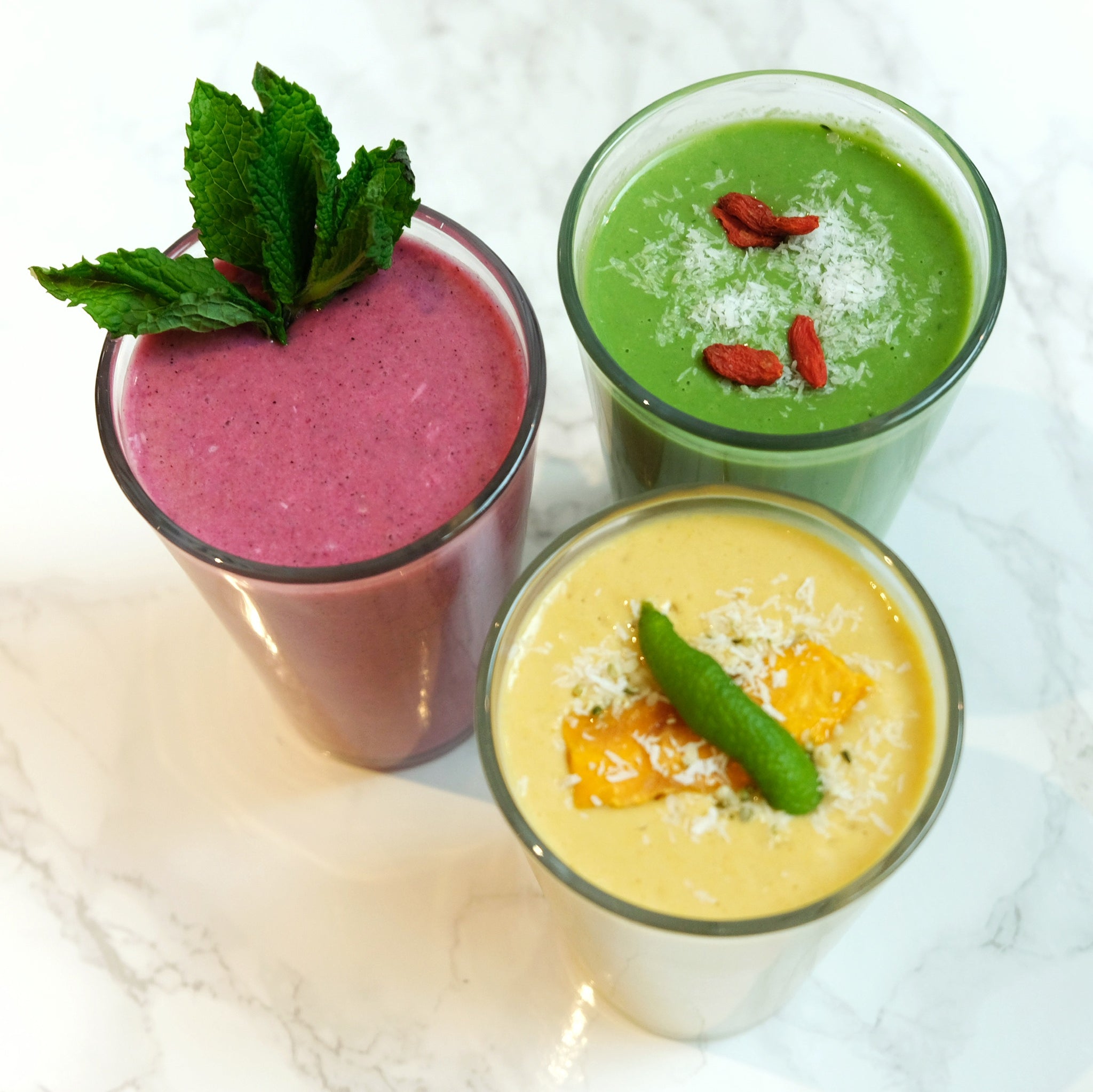
Smoothies: At the top of the list for smoothies has to be almond milk and oat milk, followed by cashew milk. Soy milk is up there too, but the taste of soy can be a turn-off for some.
Almond milk is a good source of vitamin A, vitamin D, and calcium. The small amount of fat present in the plant milk is considered “healthy” fat packed with omega-3 fatty acids. The thick texture lends perfectly for smoothies with fruits and water-laden vegetables.
Cashew milk is another option for smoothies. This plant-based milk can be thicker than almond milk, but it provides similar nutritional benefits. Cashew milk is a source of magnesium, copper, and zinc. Though the textures are the same, some people notice a significant difference in taste between the two.
Soy milk is, by far, the most popular plant-based milk. It provides fiber and antioxidants not found in other plant milks. As is the case with most plant milks, several varieties add sugar, so choose the unsweetened version if you want to limit sugar intake.

Coffee: When you stop at the local coffee shop, you may have the option to replace cow’s milk with plant-based milk for coffee or tea. But how does changing up traditional creamer for plant-based milk affect the taste and texture of coffee?
Soy is the most popular dairy alternative for coffee, but there is a problem with this choice. The acidity of the coffee can break down the soy causing it to curdle and float around.
Oat and almond milk are typically available at major coffee shops like Starbucks. Their is thick and creamy, so the texture of your coffee is about the same as it would be with creamer. However, beware of the inflammatory oils in most oat milks!
The next popular milk alternative for coffee is coconut milk. Coconut milk has a unique flavor that imparts on the coffee, which is a benefit if you like the exotic taste of coconut. It is a bit foamy, so it may separate in coffee quickly.
Cashew milk is not as popular as soy or almond milk, but it is a good choice as a creamer alternative. Cashew milk tends to have larger bubbles, so it takes on a foamy consistency that may not be appealing to all.
JOI Almond and Cashew milk can be found in hundreds of cafes, smoothies shops and restaurants throughout the United States!
Benefits of Non-Dairy Milk - Animals, Allergies, and Environment
Cow’s Milk and Animal Cruelty
Milk cows are artificially inseminated starting at about 15 months of age. Within hours or a few days of birth, the calf is removed from the mother cow, and milking begins. The male calves tend to be sold off for veal production, while the female calves are raised to produce milk like the mother cow. Cows are artificially impregnated every year and carry the calf for nine months.
Another issue with animal cruelty is that cows, including calves, are kept in small pens or packed into large groups. When artificially inseminated, female cows are forced into a shoot where they are unable to move.
“According to the EPA, a 2,000-cow dairy generates more than 240,000 pounds of manure daily or nearly 90 million pounds a year. The USDA estimates that the manure from 200 milking cows produces as much nitrogen as sewage from a community of 5,000 to 10,000 people.” That means a 2000-cow farm can produce the same amount of nitrogen as a city of nearly 100,000 just to keep up with cow milk consumption. With some dairy farms having 15,000 cows or more, the impact is extensive.
Cruelty to dairy cows is also a problem with organic farms. Not all organic farms are humane. Organic is not synonymous with cruelty-free.
Cow’s Milk and Food Allergies and Intolerance
Up to 5% of people are allergic to milk. The highest percentage is in children, who tend to drink milk more often than adults, if only because it is the primary drink in schools.
As for milk intolerance, or lactose (milk sugar) intolerance, that condition is much more widespread. It is estimated that upwards of 65% of people suffer difficulty digesting lactose. In the Asian population, the percentage is thought to be as high as 70% to 100%. According to the National Institute of Health, “lactose intolerance is also very common in people of West African, Arab, Jewish, Greek, and Italian descent.”
Symptoms of lactose intolerance include stomach pain, gas, bloating, cramping, diarrhea, and nausea. The symptoms can start as soon as 30 minutes after eating dairy products like cow’s milk. Plant-based dairy products are lactose-free.
Cow’s Milk and the Environment
What about the impact of cow's milk production on the environment?
The World Wildlife Organization estimates that “there are approximately 270 million dairy cows in the world.” Much of the impact, and the severity of the effect of cow’s milk production on the environment, is based on the practices followed on farms. However, just a few of the adverse effects on the environment include:
- Increased greenhouse gas emissions from cows and cow manure
- Manure can affect water sources
- Unsustainable farming practices, including the production of feed, destroys local ecosystems
When it comes to impact on the environment, the best plant-based milk for environmental protection must be produced without pesticides and GMOs. Rice, soy, oat, and almond milk all have less impact on emissions, land use, and water use than the production of cow’s milk says an Oxford Study.
Cow’s Milk and Your Health
Research has shown that cow’s milk and other dairy products may not be ideal for protecting against cardiovascular diseases and conditions. According to a review of research published in the American Journal of Clinical Nutrition, replacing animal fat with plant-sourced fats may reduce cardiovascular risk.
Pros and Cons of Plant-Based Milk
Pros
- Part of a balanced diet
- Lower in calories than some cow’s milk
- Some plant-based milks are high protein
- Pea protein is often added to plant milks to increase protein
- Production is less harmful to the environment
- No animal cruelty
Cons
- Most plant milks are not a good source of protein
- Plant milks aren’t a source of all amino acids like cow’s milk
- Some varieties have added sugar and preservatives
What’s the final take on plant-based milks? Whether you’re looking to address environmental concerns, skip out on dairy products for dietary reasons, or you just don’t like cow’s milk, there are more alternatives today than ever before. Though plant-based milks are considered healthier, if the ingredients include anything other than the plant source and water, you’re not getting the best nutrition your plant-based milk can provide. With JOI, you get all the taste and nourishment of the entire plant, without all of the additives many plant-based milk brands use. Try our almond, oat, cashew, hemp, coconut or oat creamer plant bases today!


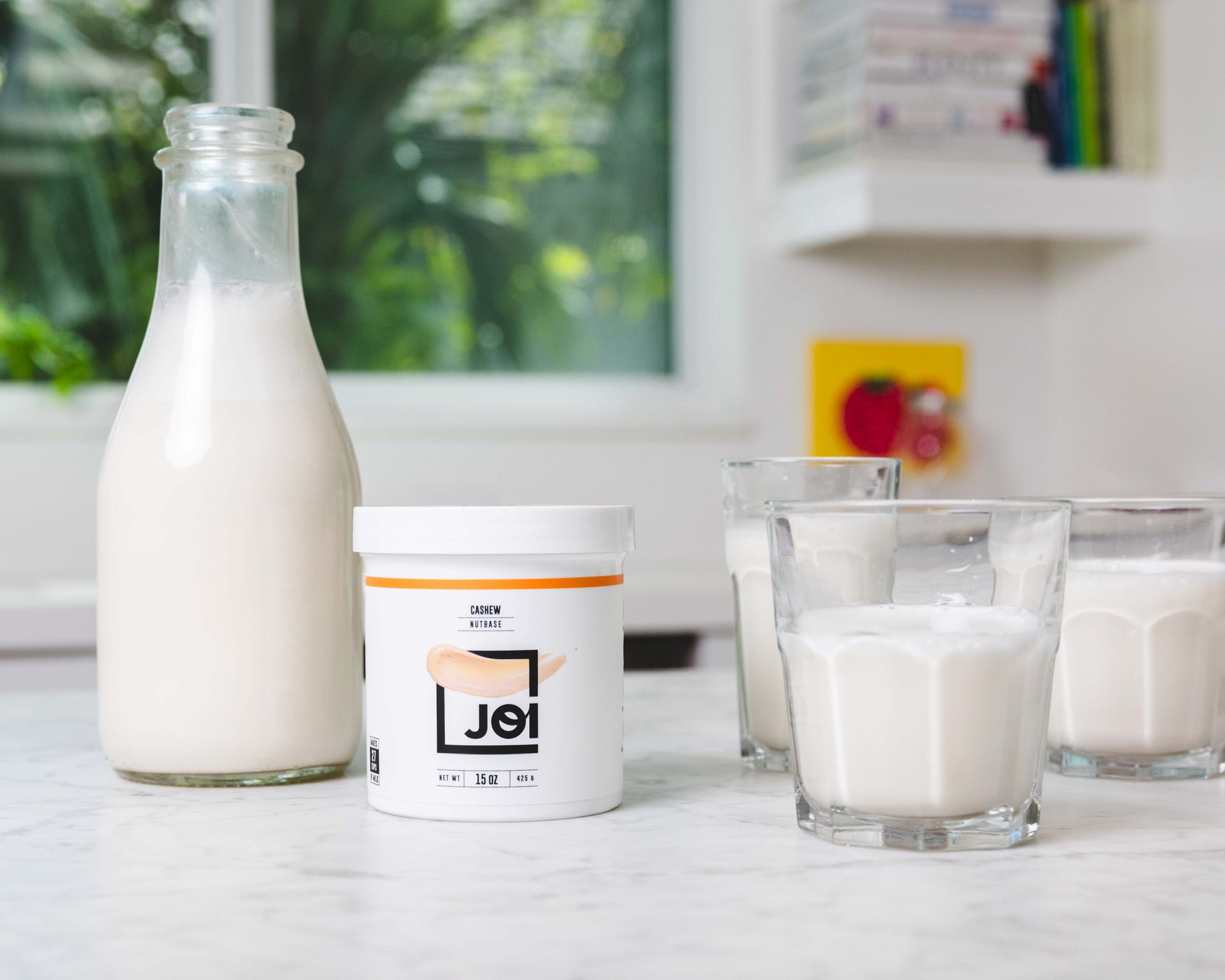
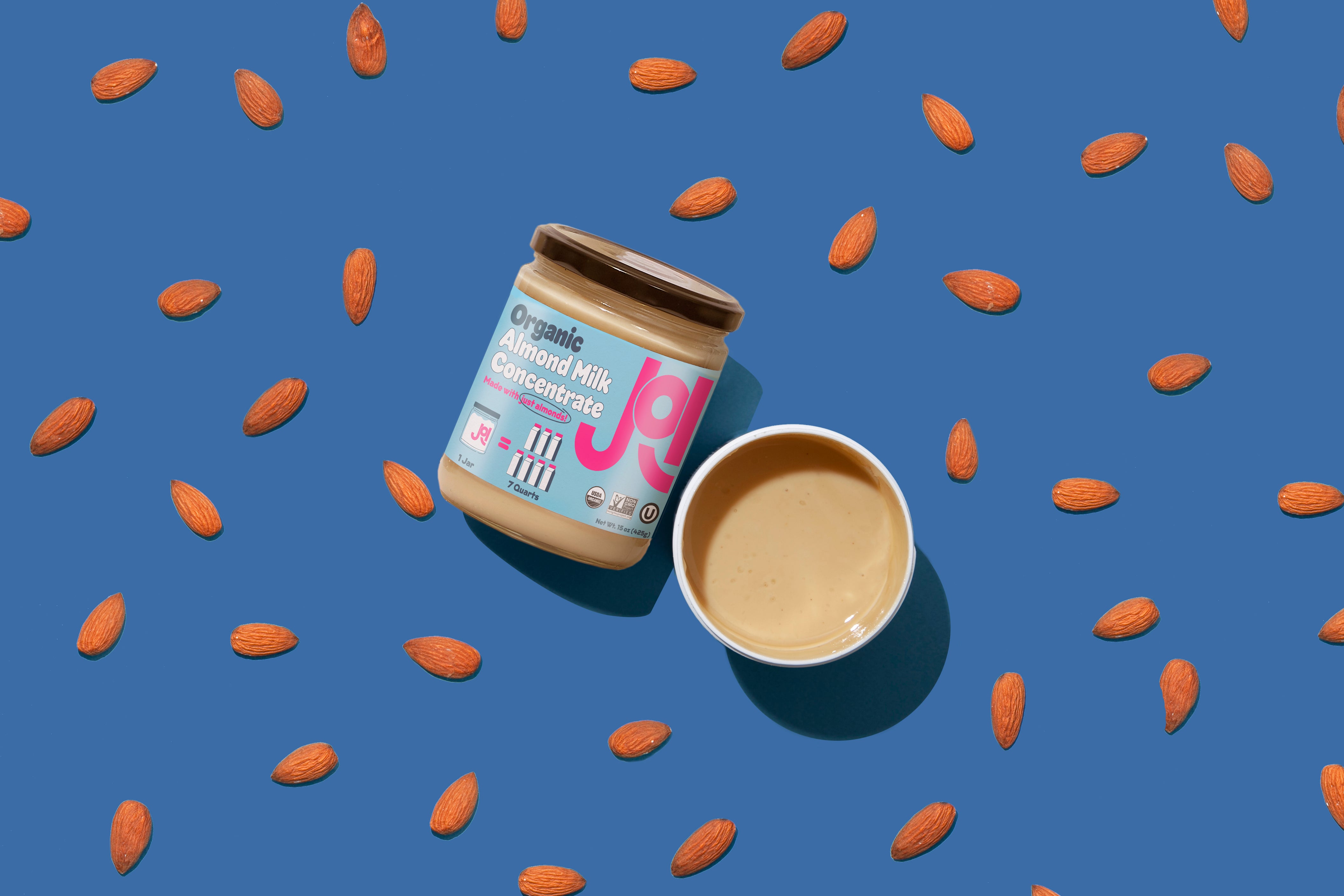
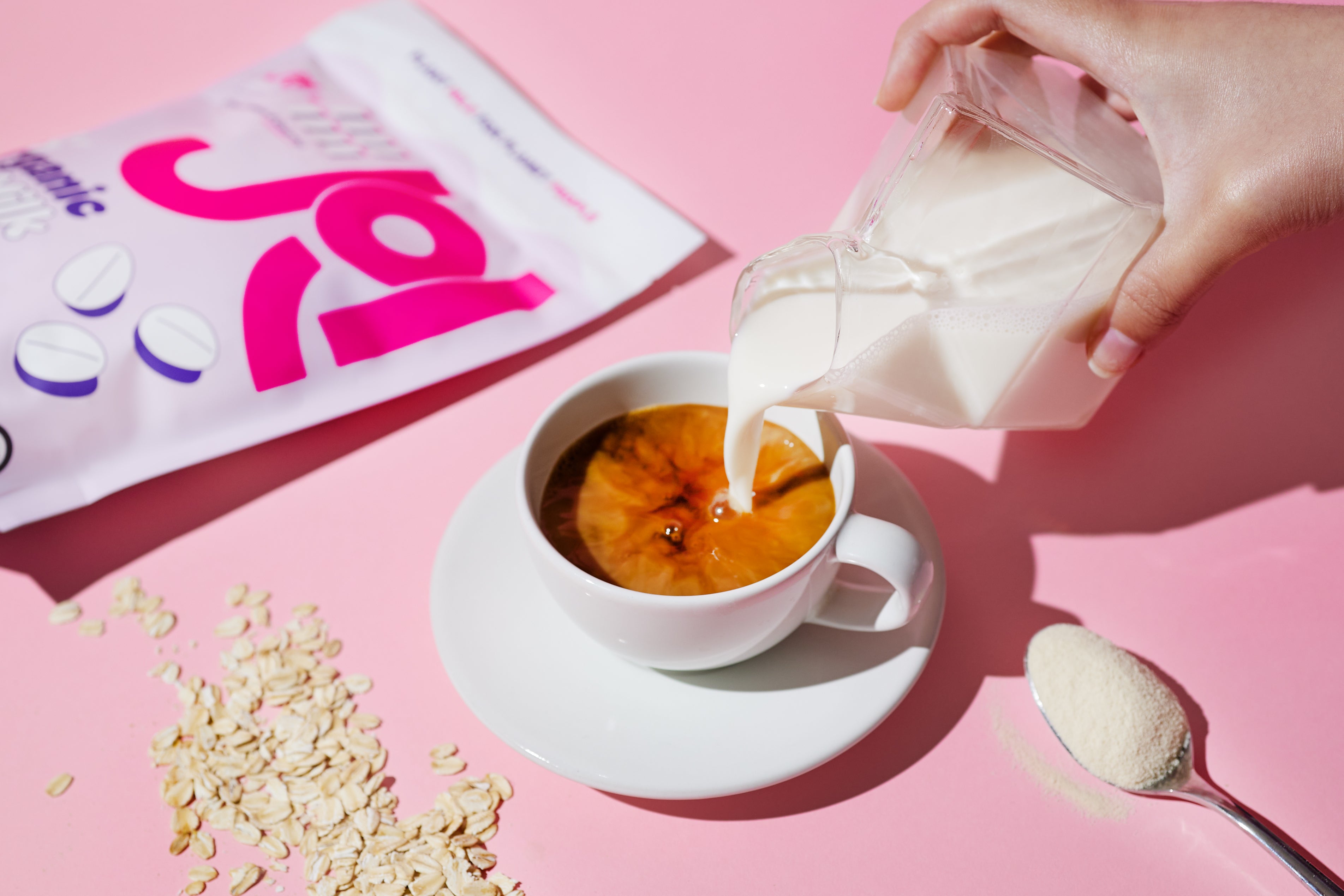
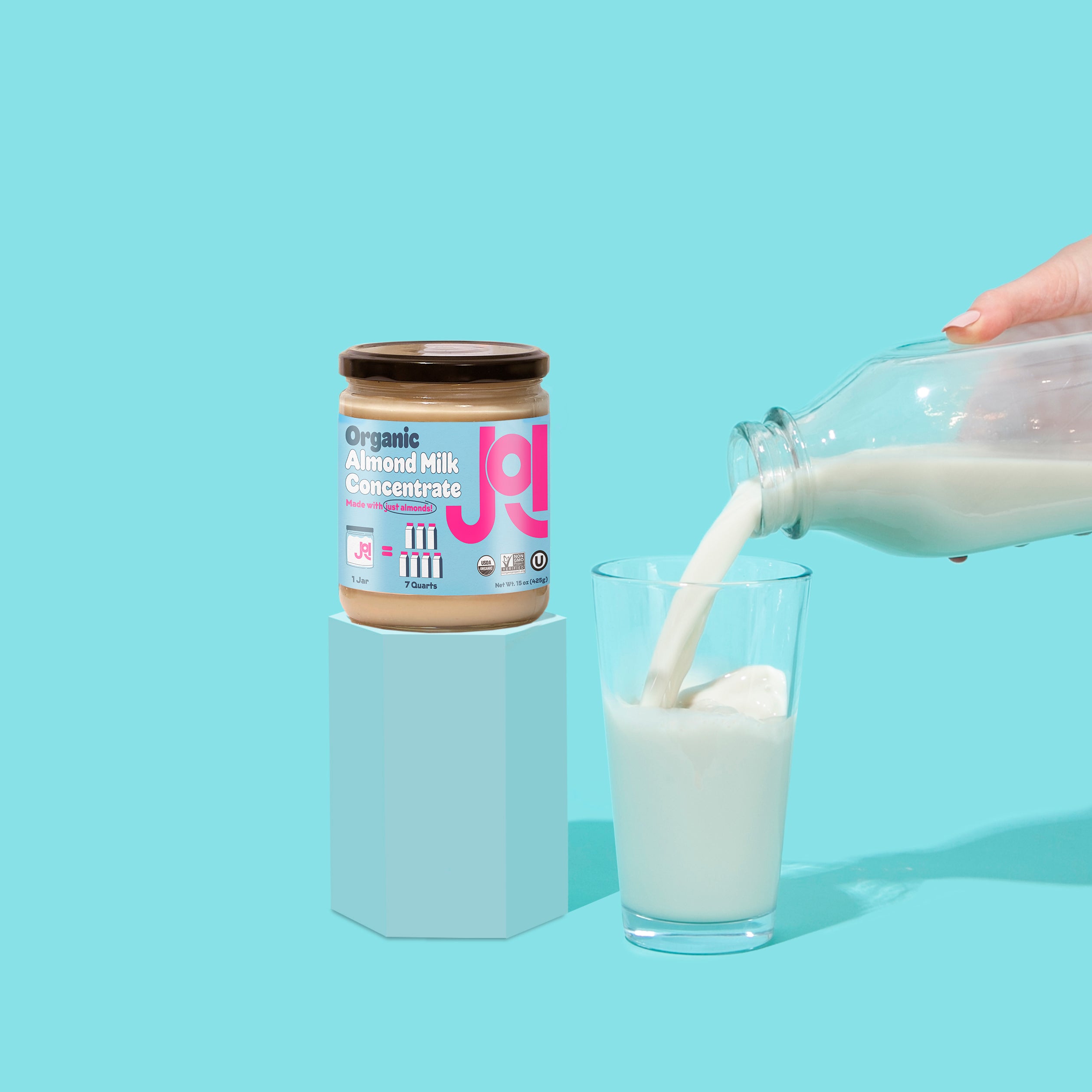
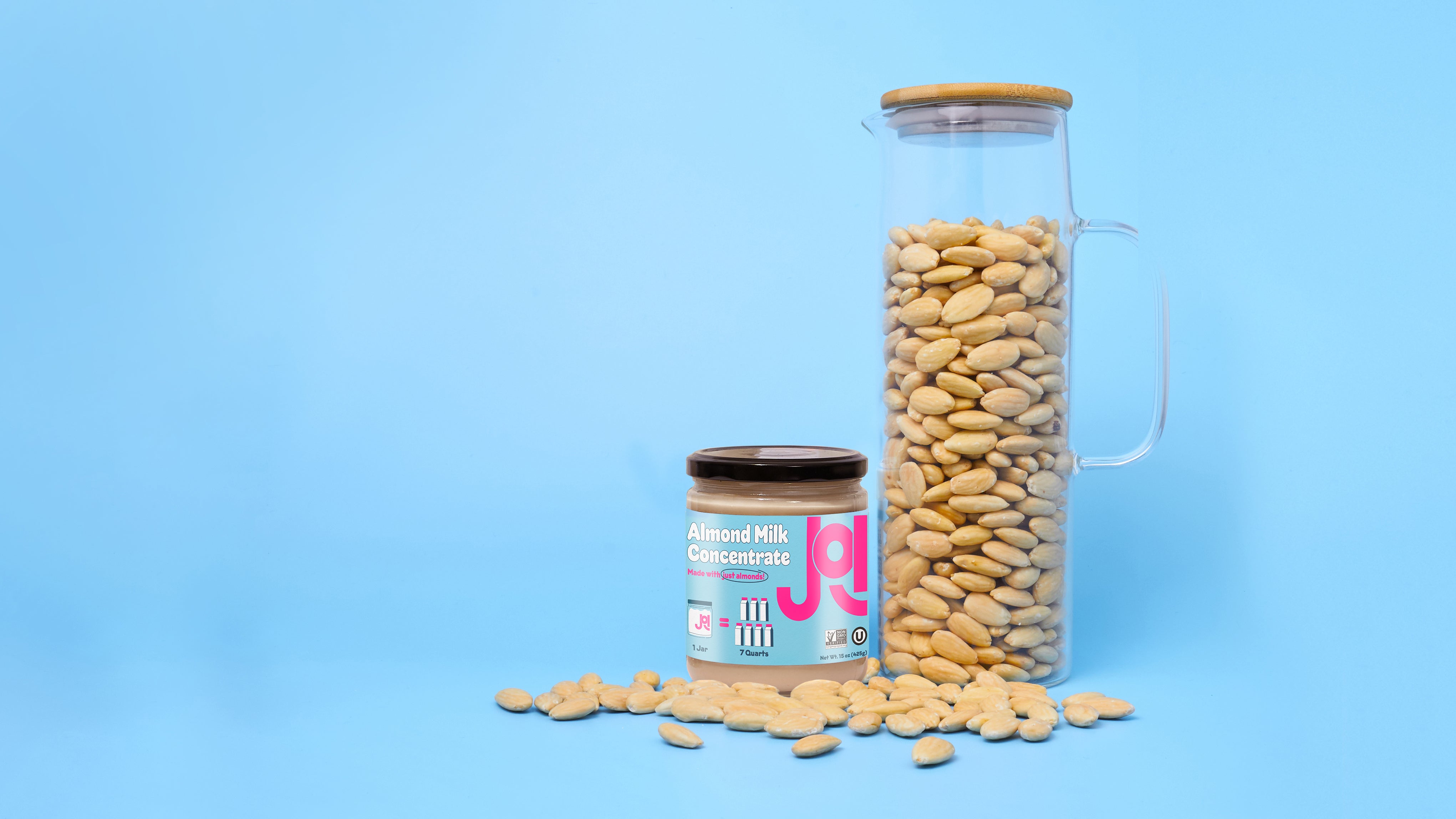
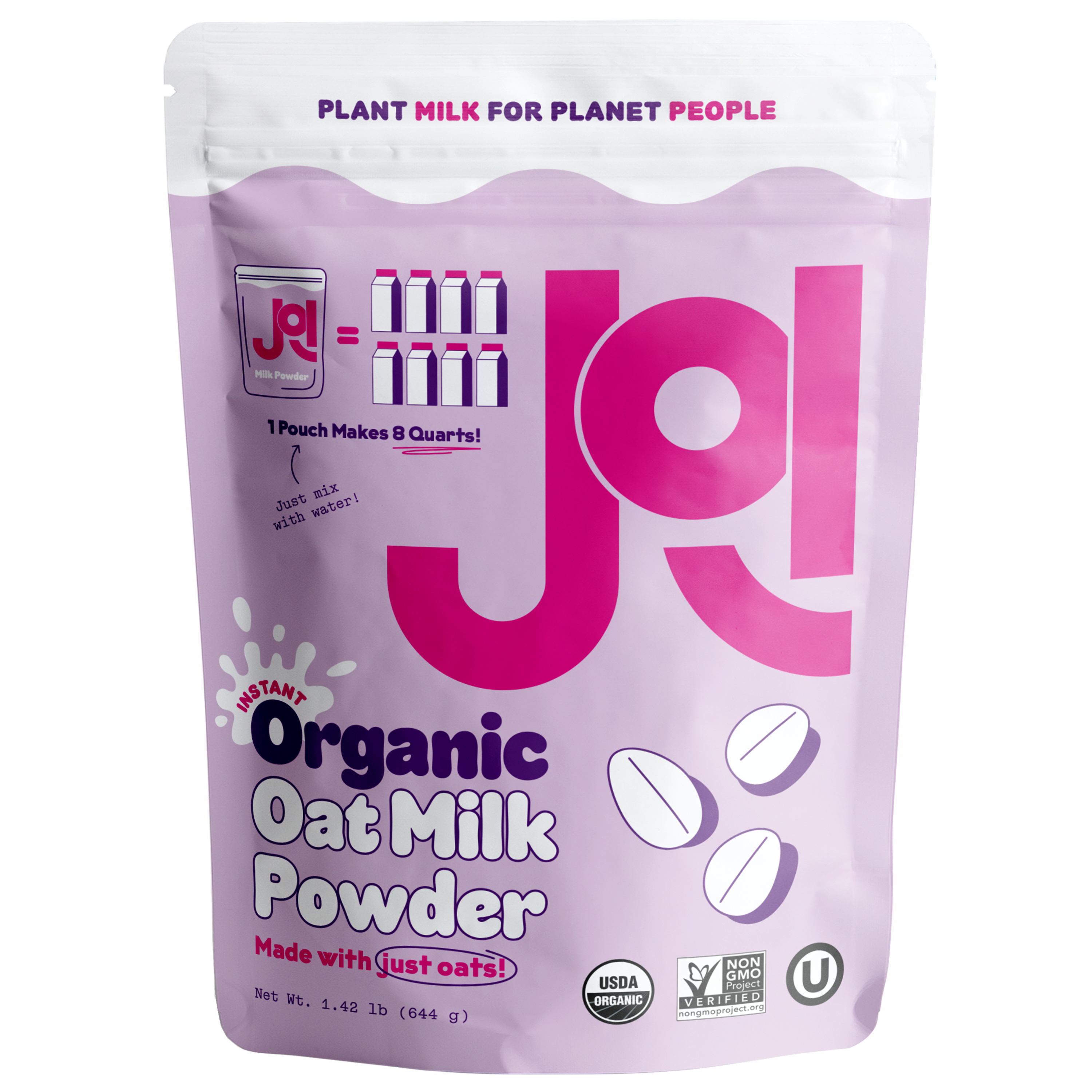
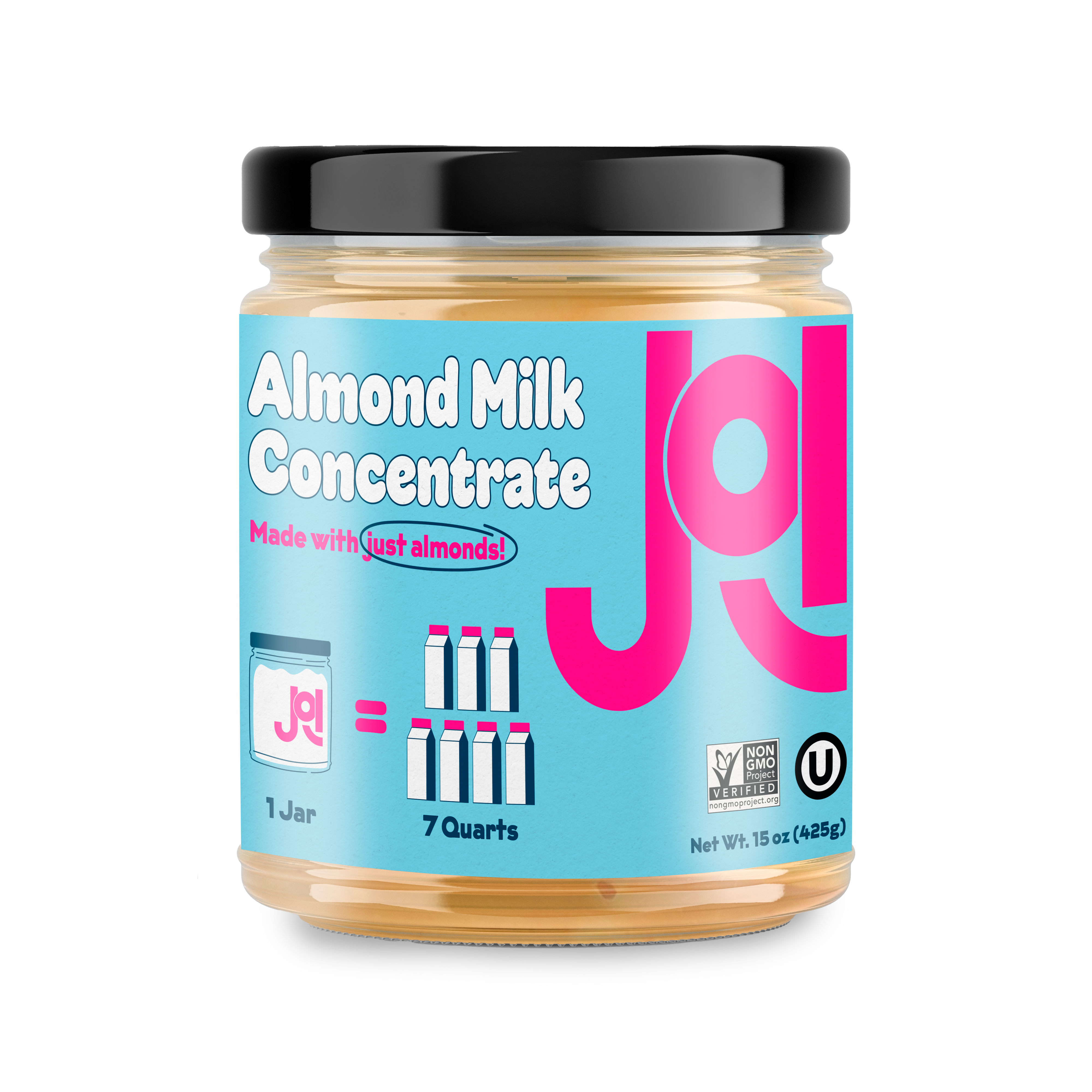
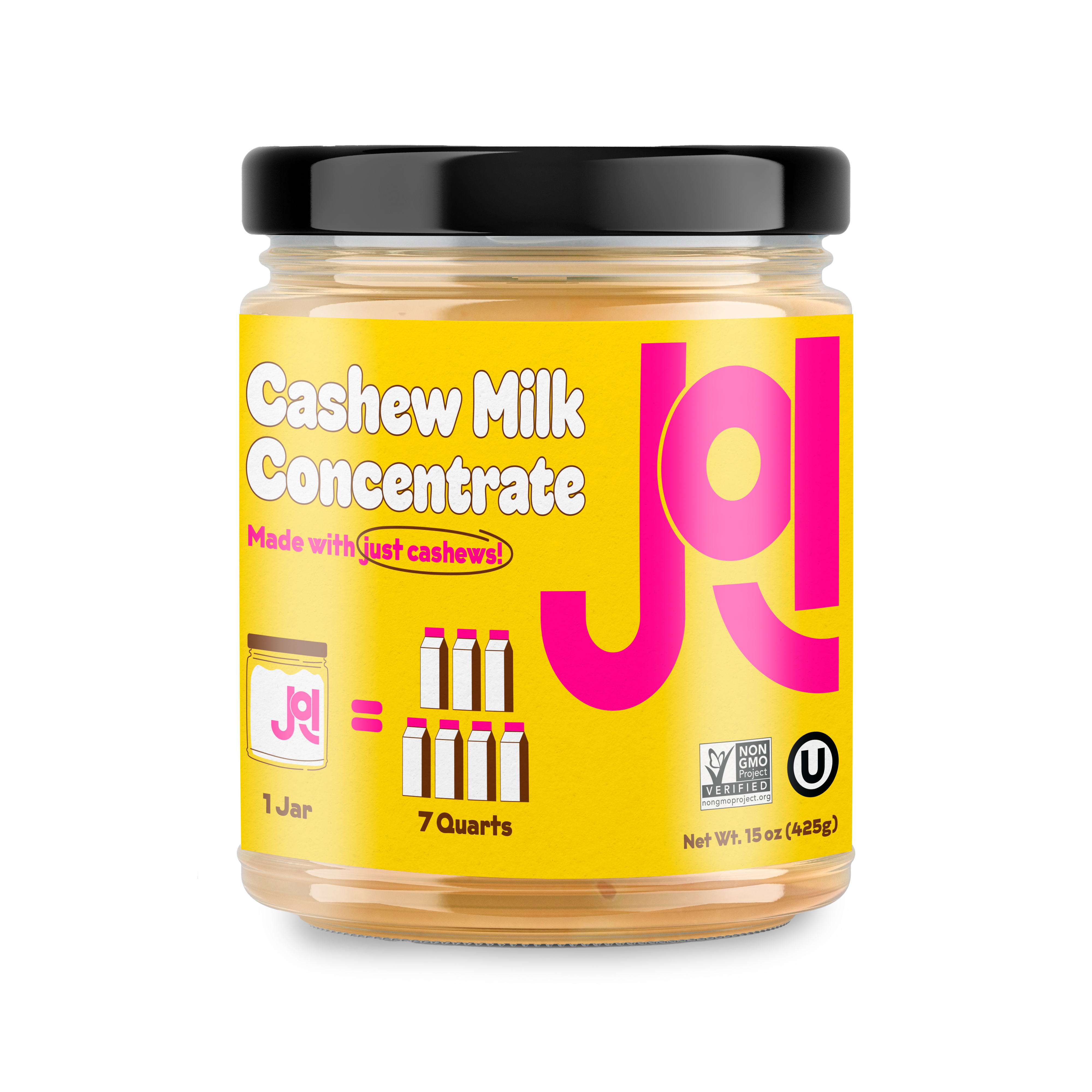
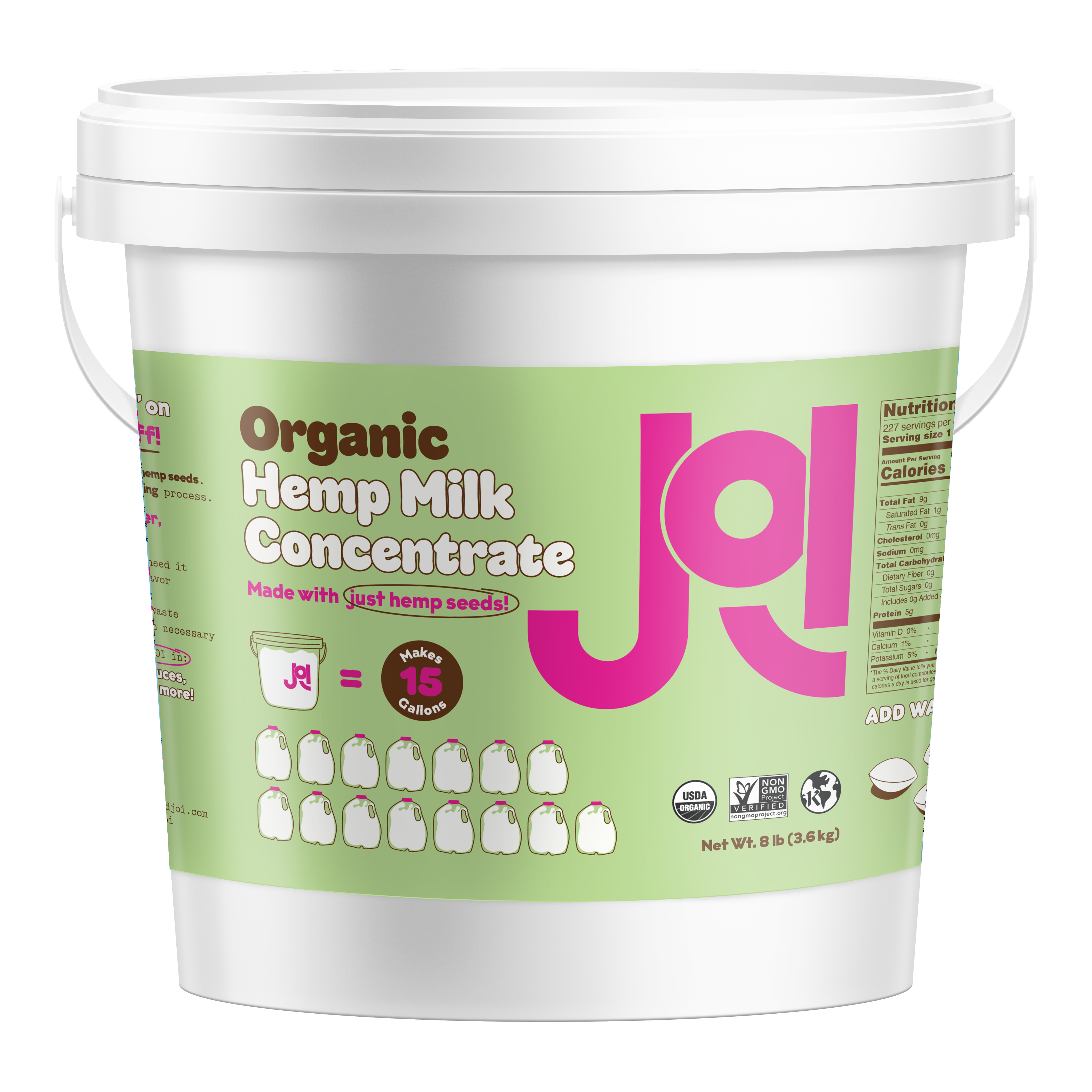
 CHECKOUT
CHECKOUT